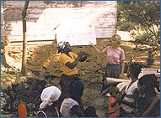Anthropology and Africa Attract Denise Roth Allen

Denise Roth Allen, behavioral scientist, Division of HIV/AIDS Prevention, is an anthropologist working on the Behavioral Surveillance Team (BST) in the Behavioral and Clinical Surveillance Branch. From 2001-2003 Allen was an EIS officer in the Division of Reproductive Health. Since 2003, she´s been in the Division of HIV/AIDS Prevention. She was in the Peace Corps from 1982 to 1986 in Gabon, Central Africa.
From 1982-1984, Allen taught beginning and intermediate English courses to seventh and eight grade students in a small rural town. "From 1985-1986, I extended my Peace Corps service to work as Peace Corps health educator in a maternal and child clinic," says Allen. "I helped train village health workers in home-based oral re-hydration and helped organize neighborhood growth monitoring clinics for children under age five."
Because of her experience working on maternal and child health issues in Gabon, she decided to get an MPH after her return home. "During the last quarter of my MPH program at UCLA, I took a course in medical anthropology and absolutely loved it! The anthropological approach to research reminded me a lot of my Peace Corps experience…living with and learning from people from a different culture. As a result, I decided to pursue doctoral studies in Anthropology. My doctoral research took me back to Africa, this time to Tanzania, where I conducted ethnographic research on women´s experiences of pregnancy and childbirth."
Her Peace Corps experience is still paying off, she says. "As part of my current job, I´ve helped develop the formative research guidelines for the National HIV Behavioral Surveillance System, which include the use of qualitative research methods. From time to time, I´ve also had opportunities to collaborate with CDC colleagues who work on international health issues. My experience as a Peace Corps health volunteer in Gabon was invaluable in that it had a direct impact on my career choice to become a cultural anthropologist working in public health."
Allen, who speaks French and Kiswahili, says it takes openness, flexibility, a willingness to learn, a respect for other ways of doing things, and a sense of humor to work effectively in different cultural settings.
- Page last reviewed: January 7, 2015
- Page last updated: January 7, 2015
- Content source:
Global Health
Notice: Linking to a non-federal site does not constitute an endorsement by HHS, CDC or any of its employees of the sponsors or the information and products presented on the site.


 ShareCompartir
ShareCompartir